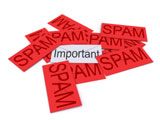Spam Blocker - How to Protect Your Email from Junk Spam
Unwanted junk email, commonly known as spam, is annoying and it's time-consuming to sift through and delete them from your inbox. Don't despair! Here is some advice on how to protect yourself from spam.
How do spammers get a hold of your email address?
Spammers can find your email address using a number of methods. They regularly scan the Internet for new addresses to spam, using special software designed for the purpose of "harvesting" these addresses off of Web pages. They also find email addresses on other Internet resources such as Usenet, acquire them from mailing lists and uncover them by brute force guessing.
 Scanning public Web pages, including home pages, discussion forums and auction sites, is one of the most common ways for spammers to find your email address. Website guestbooks and comment forms tend to publish email addresses online, so they are other typical sites from which mass-mailers can gather addresses. However, it isn't just Web pages, they also harvest email addresses from other Internet resources including Usenet, the distributed bulletin board system that was the main place for online discussions before the growth of the World Wide Web. Scanning public Web pages, including home pages, discussion forums and auction sites, is one of the most common ways for spammers to find your email address. Website guestbooks and comment forms tend to publish email addresses online, so they are other typical sites from which mass-mailers can gather addresses. However, it isn't just Web pages, they also harvest email addresses from other Internet resources including Usenet, the distributed bulletin board system that was the main place for online discussions before the growth of the World Wide Web.
Mailing lists are another favorite source of addresses. Spammers often request or buy entire mailing lists in order to find email addresses as very few of the addresses will be closed. If that request isn't met, junk mail senders can sometimes send a message to the whole mailing list to trick the server into confirming the full list of email addresses, thus giving the spammer access to these accounts. Providers of free services often make money by selling their user lists to bulk mail companies, so adding your address to such lists should be avoided.
Another way to get email addresses is by educated guessing. They know that millions of email accounts are registered at Yahoo, Hotmail, GMail and many other popular Internet service providers, so they brute force guess millions of common names and variations that are likely addresses to exist. They try to send messages to all of them, and if any work they will put it on their permanent list.
How can you protect yourself from spam email?
You can set up your email account to block emails by enabling the spam blocker or email filter that is offered by your email program or email provider. Sometimes you can setup manual filters, which can block emails containing certain words, such as "Viagra" or "enlargement." Of course, you then run the risk of deleting emails that you actually did want, just because they happen to contain one of the blocked words.
 One of the best ways to minimize unsolicited email in your inbox is to keep spammers from getting your address in the first place. As mentioned above, junk e-mail senders can find your email address through Web pages, using specialized programs to search the Web and locate email addresses. Therefore, you do not want to put your email address on any page that is publicly available on the internet. Do not put it on your homepage, MySpace, discussion forums, comments, Usenet postings or any other Internet source if you want to protect the account from junk email. One of the best ways to minimize unsolicited email in your inbox is to keep spammers from getting your address in the first place. As mentioned above, junk e-mail senders can find your email address through Web pages, using specialized programs to search the Web and locate email addresses. Therefore, you do not want to put your email address on any page that is publicly available on the internet. Do not put it on your homepage, MySpace, discussion forums, comments, Usenet postings or any other Internet source if you want to protect the account from junk email.
You can find out if your email address is on any web pages by typing your email address into Google, Yahoo, MSN or other search engines and looking at the results that come up. If your email is address is published online, there's precious little you can do about it. You can try to remove it from the pages that contain it, but you may not be able to edit or remove many of the pages it is on. Even if you can, it's probably too late. The spammers probably already have it, and once they have it they will continually send emails to it. You may need to throw in the towel and switch a new email address–making sure it is never published online in the future.
In addition, be very careful about giving your email address out during registrations. For example, do not give the email out to sign up for a freebie or other offers from companies you don't know about, because they may sell your information to companies sending bulk email. Generally you will not have a problem if you use your email address with large, well-respected companies, such as top online stores, but in these cases it is still a good idea to check the privacy policy to be sure what they will do with your data.
 Don't be tempted to reply to junk email or try to unsubscribe. Unsubscribing in these cases often doesn't even work at all, and worse it may confirm to the spammer that your email address is still in use. They will then continue to bombard you with unwanted emails. Don't be tempted to reply to junk email or try to unsubscribe. Unsubscribing in these cases often doesn't even work at all, and worse it may confirm to the spammer that your email address is still in use. They will then continue to bombard you with unwanted emails.
Temporary, disposable email addresses can be a great way to protect your email account. If you want to sign up for something that you feel might leave you open to spam email, get yourself a temporary email address from Jetable or Sneak Email. You can easily delete the account as soon as spam starts coming through, and open another one as needed. Another similar service is E4ward, which offers a forwarding service and aliases that counteracts spammers.
Another tip is to select your email address carefully. Don't pick anything that will be easy to guess, since they attempt millions of variations to guess likely addresses. For example, using your name as your email address makes it easier for junk emailers to guess your address, since they often try all variations of first and last names as possible addresses.
Decide if you really need to sign up for mailing lists and discussion groups. If you do, set up a web-based email account specifically for these kinds of purposes, so it doesn't matter if you get spammed.
These tips won't necessarily stop you getting spam ever again in the future, but they should cut down the amount you get and go some way towards cutting it out completely when you combine this advice with a quality spam blocker or email filter.
Compare Internet Providers: Dial Up - DSL - Cable - Satellite - Wireless - VOIP
More Articles and Information:
|